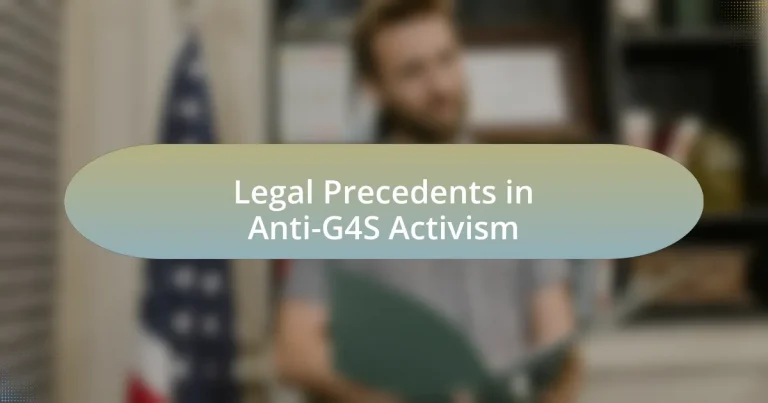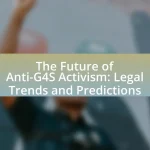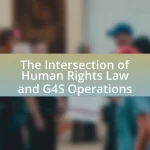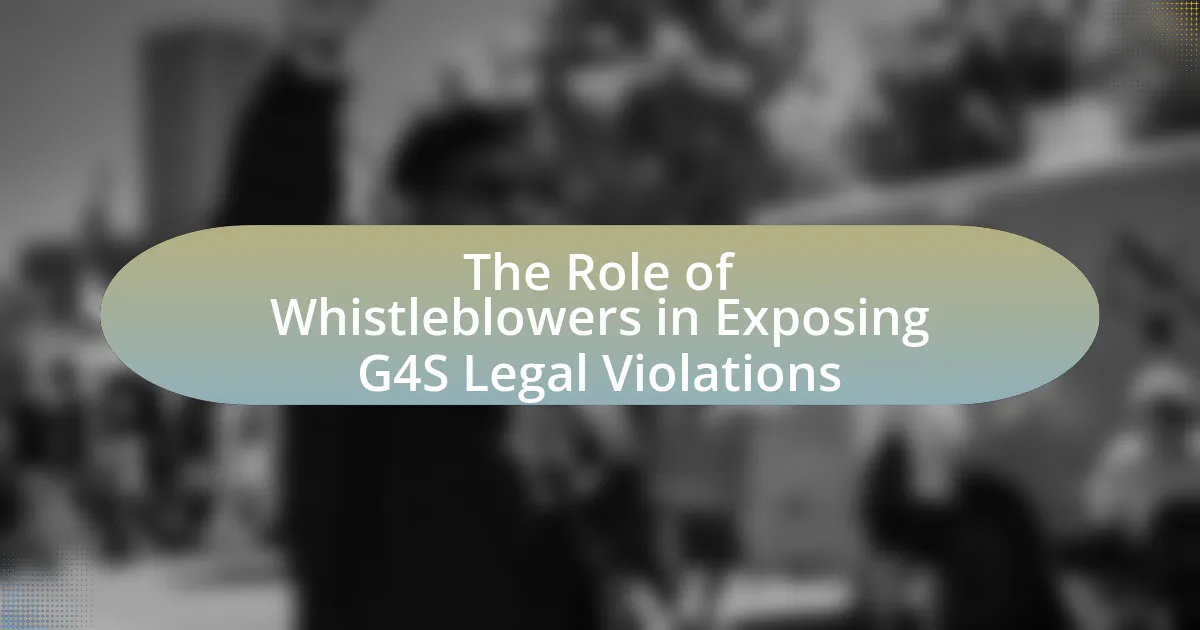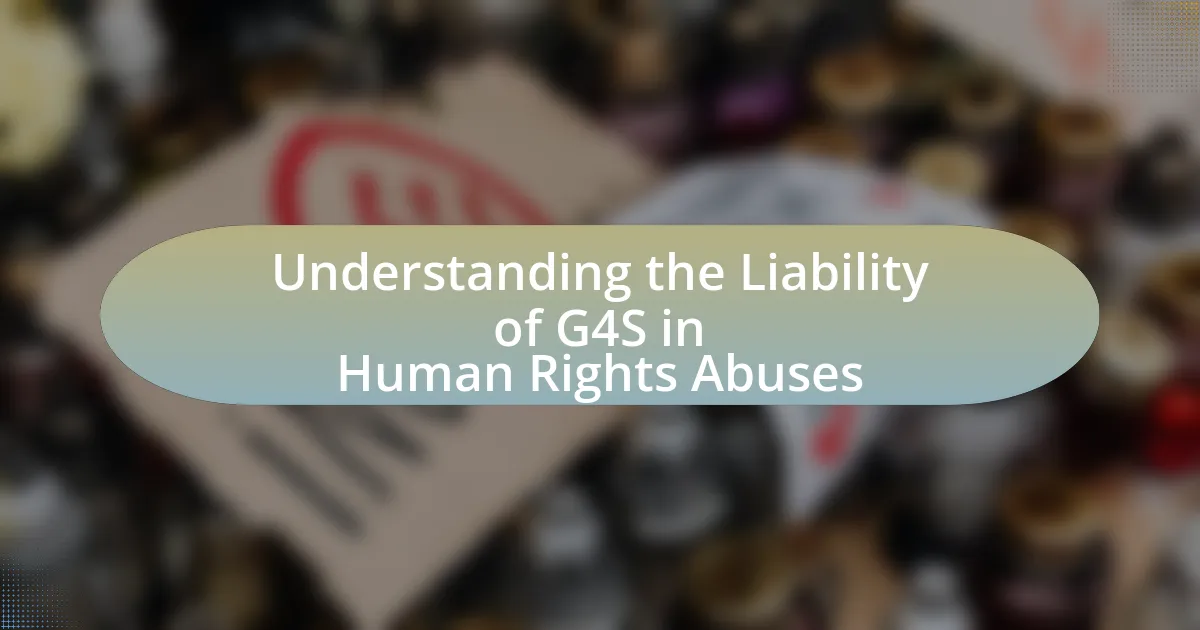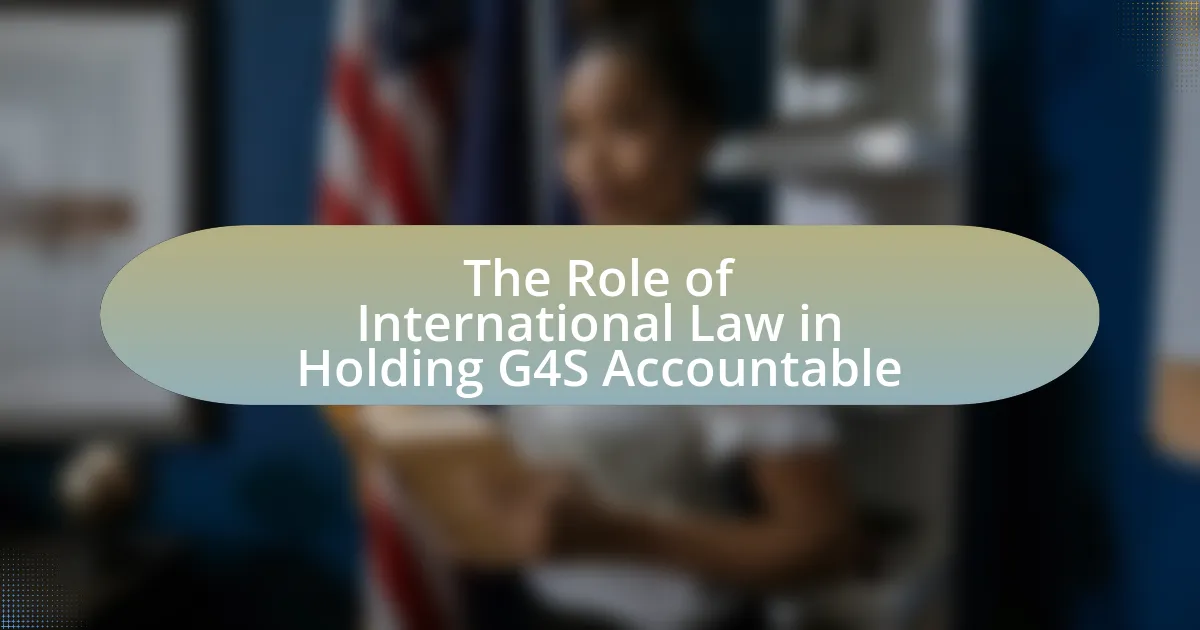Legal precedents in anti-G4S activism encompass judicial decisions that establish legal principles relevant to actions against G4S, a security company criticized for its controversial practices. The article explores how these precedents influence activism strategies, including the rights to free speech and assembly, and the legal frameworks that activists can leverage to challenge G4S’s operations. It highlights significant court rulings that empower activists, the impact of successful legal cases on public perception, and the challenges faced in establishing legal precedents against a well-resourced corporation. Additionally, the article discusses the role of international law and human rights standards in shaping legal arguments and the strategies activists can employ to navigate legal obstacles effectively.
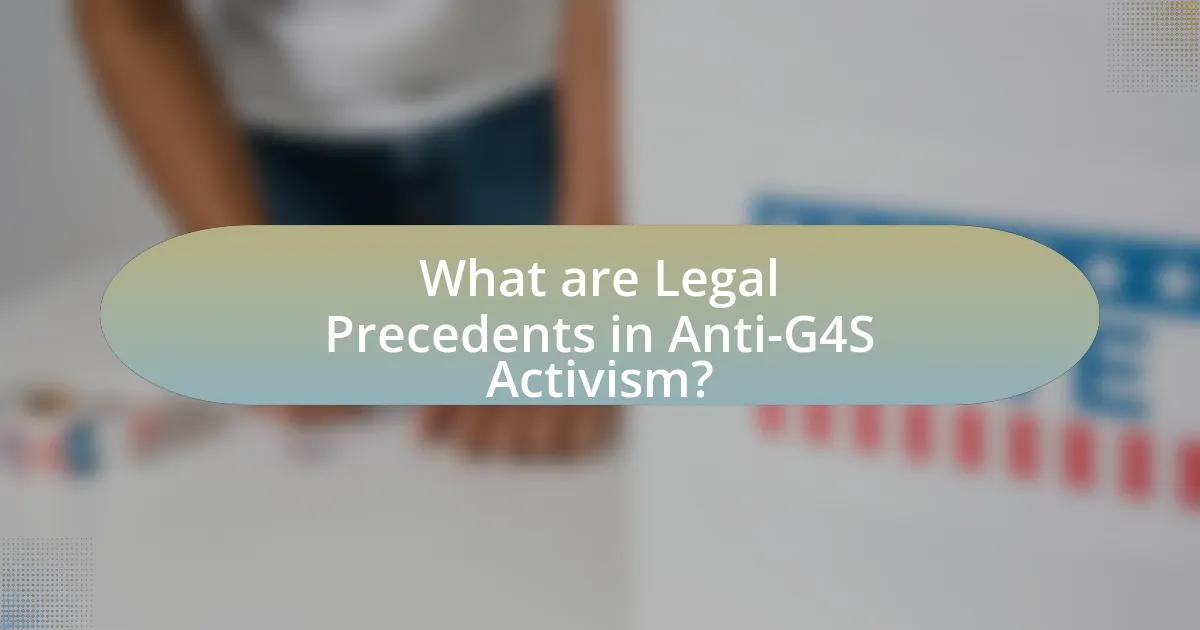
What are Legal Precedents in Anti-G4S Activism?
Legal precedents in anti-G4S activism refer to judicial decisions that have established legal principles relevant to actions against G4S, a security company often criticized for its involvement in controversial practices. These precedents can include cases where courts have ruled on issues such as freedom of speech, assembly rights, and the legality of protests against corporate entities. For instance, the case of R (on the application of B) v. Secretary of State for the Home Department (2019) highlighted the balance between public order and the right to protest, influencing how activists can legally challenge G4S’s operations. Such legal rulings provide a framework for future activism, guiding how protests can be conducted within the bounds of the law while addressing the actions of G4S.
How do legal precedents influence anti-G4S activism?
Legal precedents significantly influence anti-G4S activism by providing a framework for legal arguments and strategies used by activists. Activists often reference previous court rulings that have addressed issues related to human rights, corporate accountability, and state complicity in violations, which can strengthen their claims against G4S. For instance, legal cases that have established the liability of corporations for complicity in human rights abuses serve as a basis for activists to argue that G4S, as a security provider involved in controversial operations, should be held accountable for its actions. This reliance on established legal precedents not only legitimizes the activists’ positions but also guides their tactics in litigation and public campaigns, thereby enhancing the effectiveness of their activism.
What role do court decisions play in shaping activism strategies?
Court decisions significantly influence activism strategies by establishing legal precedents that activists can leverage to support their causes. For instance, rulings that affirm the rights to free speech and assembly empower activists to organize protests and campaigns more effectively. Additionally, court decisions can clarify the legal boundaries of acceptable protest behavior, guiding activists in their planning and execution. Historical examples, such as the Supreme Court’s ruling in Tinker v. Des Moines Independent Community School District (1969), which protected student protest rights, demonstrate how legal outcomes can embolden activists and shape their approaches to advocacy.
How can activists leverage legal precedents in their campaigns?
Activists can leverage legal precedents in their campaigns by using established court rulings to support their arguments and strategies. For instance, activists can reference landmark cases that have set legal standards relevant to their causes, such as civil rights or environmental protection, to strengthen their claims and mobilize public support. By citing specific rulings, such as the Supreme Court’s decision in Brown v. Board of Education, which established the unconstitutionality of racial segregation, activists can illustrate the legal foundation for their demands and demonstrate the potential for judicial support. This approach not only legitimizes their efforts but also provides a framework for challenging unjust practices, as seen in various successful campaigns that have utilized legal precedents to effect change.
Why are legal precedents important for anti-G4S activists?
Legal precedents are important for anti-G4S activists because they provide a framework for understanding and challenging the legality of G4S’s actions. These precedents can establish legal standards that may support claims of human rights violations or unlawful practices associated with G4S’s operations. For instance, previous court rulings on similar cases can guide activists in formulating their legal strategies, enhancing their chances of success in litigation. Additionally, successful legal challenges based on established precedents can lead to broader implications, potentially influencing public policy and corporate accountability regarding G4S’s role in controversial activities, such as immigration detention and security services in conflict zones.
What impact do successful legal cases have on public perception?
Successful legal cases significantly enhance public perception by validating the concerns of activists and demonstrating the effectiveness of legal action in addressing social issues. When a legal case results in a favorable outcome, it often leads to increased public awareness and support for the underlying cause, as seen in various movements where legal victories have galvanized community engagement and advocacy. For instance, the successful litigation against companies involved in human rights abuses can shift public opinion, encouraging more individuals to align with the activists’ goals and participate in related initiatives. This phenomenon is supported by research indicating that high-profile legal victories can lead to a measurable increase in public support for social justice movements, as they provide tangible evidence that change is possible through legal channels.
How do legal victories affect the operational practices of G4S?
Legal victories significantly influence the operational practices of G4S by prompting the company to reassess and modify its policies and procedures to mitigate future legal risks. For instance, when G4S faces successful litigation related to labor practices or human rights violations, it often leads to increased scrutiny of its operational protocols, resulting in enhanced training for staff, improved compliance measures, and adjustments in contract management. These changes are aimed at preventing recurrence of similar legal challenges, as evidenced by G4S’s response to past lawsuits which included implementing more rigorous oversight and accountability mechanisms in their operations.
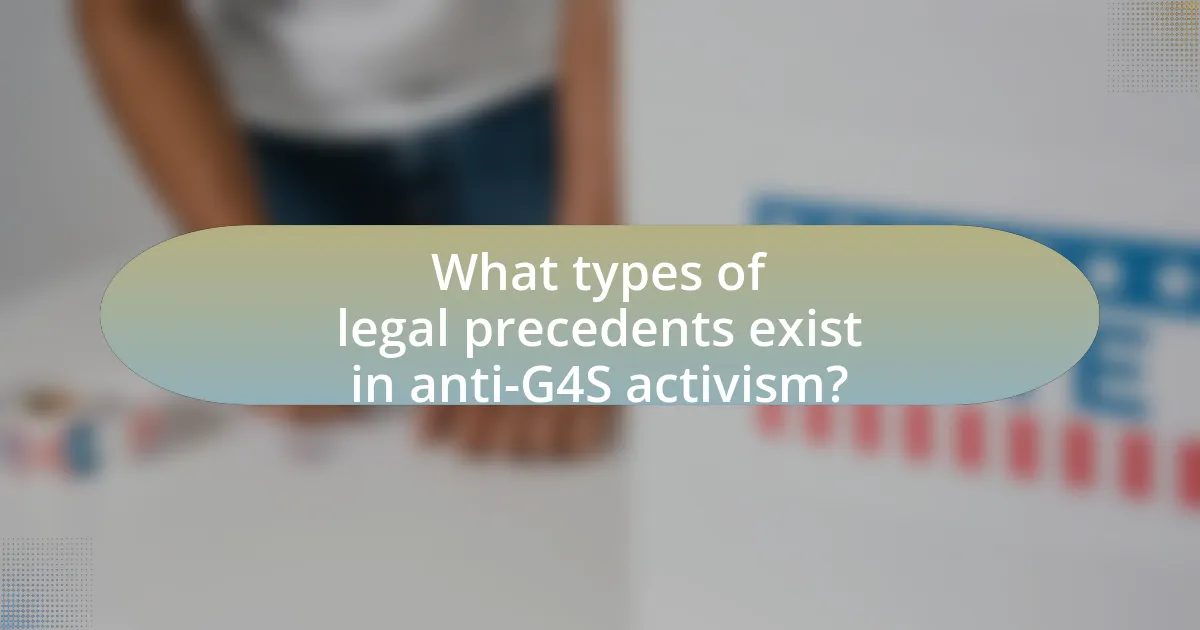
What types of legal precedents exist in anti-G4S activism?
Legal precedents in anti-G4S activism primarily include cases related to civil disobedience, freedom of speech, and the right to protest. Activists have often relied on legal rulings that affirm their rights to assemble and express dissent against G4S’s involvement in controversial practices, such as privatized detention and security services. For instance, the case of R v. Jones (2006) established that peaceful protest is protected under the European Convention on Human Rights, reinforcing the legal standing of activists who engage in non-violent demonstrations against G4S. Additionally, rulings in cases like McLibel (1997) have highlighted the importance of free speech in the context of corporate accountability, which activists leverage to challenge G4S’s operations. These precedents provide a framework for legal arguments that support anti-G4S activism, emphasizing the balance between corporate interests and individual rights.
What are the key categories of legal precedents relevant to this activism?
The key categories of legal precedents relevant to anti-G4S activism include civil rights, labor law, and international human rights law. Civil rights precedents often address issues of discrimination and the right to protest, which activists leverage to challenge G4S’s practices. Labor law precedents are significant as they pertain to workers’ rights and conditions, particularly in relation to G4S employees. International human rights law precedents provide a framework for addressing violations related to security practices and the treatment of individuals in detention or conflict zones, which are often associated with G4S’s operations. These categories collectively inform the legal strategies employed by activists against G4S.
How do criminal cases against activists shape future actions?
Criminal cases against activists significantly influence future actions by creating legal precedents that can either deter or galvanize further activism. For instance, when activists face prosecution, it often leads to increased public awareness and solidarity, as seen in the cases of environmental and social justice movements where legal battles have sparked larger campaigns. Historical examples include the 2016 Standing Rock protests against the Dakota Access Pipeline, where arrests of activists drew national attention and mobilized support, ultimately shaping future environmental activism strategies. Additionally, the outcomes of these cases can establish legal standards that either restrict or protect activist actions, influencing how future movements strategize their approaches to advocacy and protest.
What civil cases have set important precedents for anti-G4S efforts?
Civil cases that have set important precedents for anti-G4S efforts include the case of R (on the application of A) v. Secretary of State for the Home Department (2015), where the UK High Court ruled against the use of G4S in immigration detention due to inadequate conditions and treatment of detainees. This ruling highlighted the legal responsibilities of private contractors in providing humane treatment. Another significant case is Hernandez v. G4S Secure Solutions (2016), where a jury found G4S liable for wrongful termination and discrimination, establishing a precedent for employee rights and accountability within the company. These cases have reinforced the legal framework for challenging G4S’s practices and have empowered activists to pursue further legal actions against the company.
How do international legal frameworks impact anti-G4S activism?
International legal frameworks significantly influence anti-G4S activism by providing a basis for legal challenges against the company’s operations, particularly in relation to human rights violations. These frameworks, such as the International Covenant on Civil and Political Rights and the UN Guiding Principles on Business and Human Rights, establish standards that G4S must adhere to, thereby empowering activists to hold the company accountable. For instance, activists have utilized these legal instruments to argue that G4S’s involvement in controversial practices, such as operating in Israeli prisons, violates international law. This legal backing enhances the credibility of anti-G4S campaigns and can lead to increased public awareness and pressure on the company to change its practices.
What role do human rights laws play in shaping legal precedents?
Human rights laws significantly influence the formation of legal precedents by establishing fundamental standards that courts must consider in their rulings. These laws provide a framework for interpreting rights and freedoms, guiding judges in their decisions and ensuring that legal outcomes align with international human rights norms. For instance, cases such as the European Court of Human Rights’ rulings have set precedents that require states to uphold individual rights, thereby shaping national legal systems. This interplay between human rights laws and judicial decisions fosters a legal environment where human dignity and justice are prioritized, ultimately impacting future cases and legal interpretations.
How can activists utilize international law to challenge G4S practices?
Activists can utilize international law to challenge G4S practices by invoking human rights treaties and conventions that G4S may violate through its operations. For instance, activists can reference the International Covenant on Civil and Political Rights, which mandates the protection of individual rights, to argue that G4S’s actions in conflict zones infringe upon these rights. Additionally, activists can leverage the UN Guiding Principles on Business and Human Rights, which outline the responsibility of companies to respect human rights, to hold G4S accountable for its involvement in controversial practices, such as detention and surveillance. By documenting specific instances of human rights abuses linked to G4S, activists can build legal cases that may lead to international scrutiny and potential sanctions against the company.
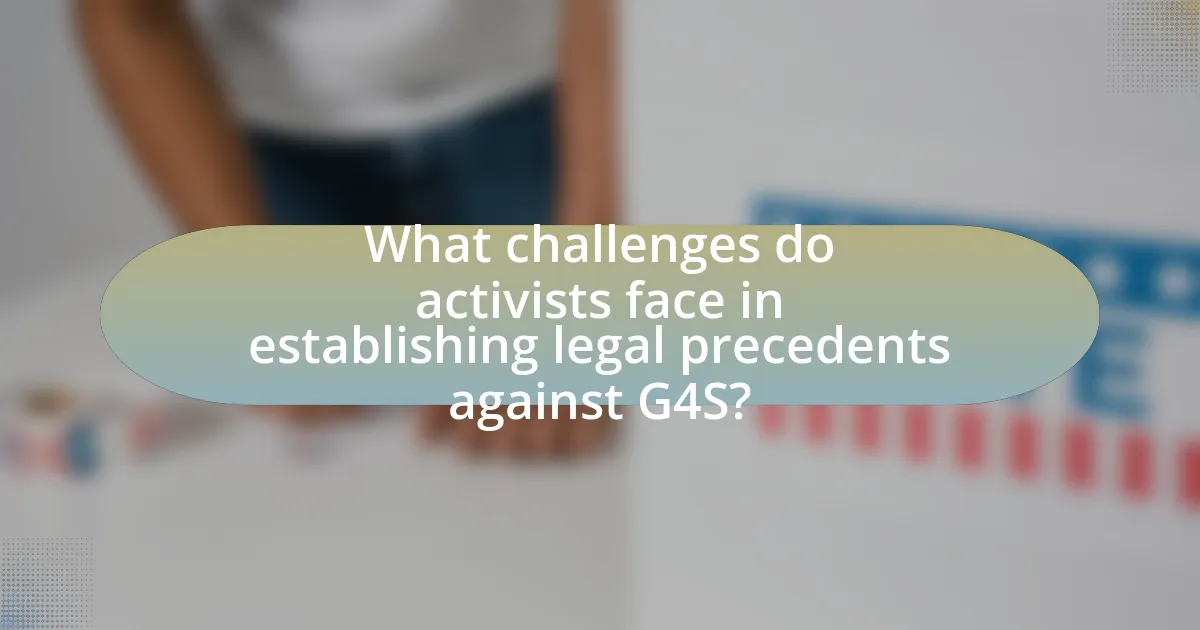
What challenges do activists face in establishing legal precedents against G4S?
Activists face significant challenges in establishing legal precedents against G4S, primarily due to the company’s extensive legal resources and influence. G4S, as a multinational security firm, possesses substantial financial backing that allows it to mount robust legal defenses against claims. Additionally, activists often encounter difficulties in gathering sufficient evidence to support their allegations, as G4S operates in various jurisdictions with differing legal standards and protections. The complexity of international law and the varying interpretations of human rights issues further complicate the legal landscape. Furthermore, activists may struggle with public perception and media coverage, which can affect the momentum of their campaigns and the willingness of courts to take their cases seriously. These factors collectively hinder the ability of activists to create impactful legal precedents against G4S.
What legal barriers hinder anti-G4S activism?
Legal barriers that hinder anti-G4S activism include laws related to public assembly, anti-protest legislation, and defamation laws. Public assembly laws often require permits for demonstrations, which can limit the ability to organize protests effectively. Anti-protest legislation, such as laws that impose heavy fines or criminal charges for certain protest activities, can deter activists from participating. Additionally, defamation laws can be used to silence critics by threatening legal action against those who speak out against G4S, creating a chilling effect on free speech. These legal frameworks create significant obstacles for activists seeking to challenge the practices of G4S.
How do laws regarding protest and assembly affect activism?
Laws regarding protest and assembly significantly shape activism by determining the legal framework within which activists can operate. These laws can either facilitate or hinder the ability of individuals and groups to organize, express dissent, and mobilize for social change. For instance, restrictive laws that impose heavy penalties for unauthorized gatherings can deter participation and limit the effectiveness of protests, as seen in various countries where such regulations have led to decreased public demonstrations. Conversely, laws that protect the right to assemble and protest, such as the First Amendment in the United States, empower activists by providing them with a legal basis to challenge injustices and advocate for their causes. Historical examples, such as the Civil Rights Movement, illustrate how legal protections for assembly enabled large-scale activism that led to significant social reforms.
What are the implications of defamation laws on activist campaigns?
Defamation laws significantly impact activist campaigns by imposing legal risks that can deter individuals from speaking out against organizations. Activists may face lawsuits for making statements that could be construed as damaging to a person’s or entity’s reputation, which can lead to financial burdens and chilling effects on free speech. For instance, in the case of “Gertz v. Robert Welch, Inc.” (1974), the U.S. Supreme Court established that public figures must prove actual malice to win a defamation case, highlighting the heightened scrutiny activists face when addressing powerful entities. This legal landscape can create a hesitance among activists to engage in robust criticism, ultimately affecting the effectiveness and reach of their campaigns.
How can activists overcome these challenges?
Activists can overcome challenges in anti-G4S activism by leveraging legal precedents to strengthen their cases and mobilizing community support to amplify their voices. Utilizing established legal frameworks allows activists to navigate the judicial system effectively, as seen in cases where previous rulings have set favorable outcomes for similar protests or actions. For instance, the successful use of the First Amendment in various civil rights cases has provided a foundation for activists to assert their rights to free speech and assembly, thereby enhancing their legal strategies. Additionally, building coalitions with other organizations can provide resources, expertise, and a broader platform for advocacy, which has proven effective in past movements against corporate practices.
What strategies can be employed to navigate legal obstacles?
To navigate legal obstacles in anti-G4S activism, activists can employ strategies such as legal education, coalition building, and strategic litigation. Legal education equips activists with knowledge about their rights and relevant laws, enabling them to understand the legal landscape and anticipate challenges. Coalition building fosters alliances with other organizations, enhancing resources and support, which can amplify their voice and influence. Strategic litigation involves selecting cases that can set favorable legal precedents, thereby creating a more supportive legal environment for future activism. For instance, the successful legal challenges against G4S’s involvement in controversial practices have demonstrated how targeted litigation can lead to significant changes in policy and public perception.
How can collaboration with legal experts enhance activism efforts?
Collaboration with legal experts enhances activism efforts by providing activists with essential legal knowledge and strategies to navigate complex legal frameworks. Legal experts can help activists understand their rights, identify potential legal risks, and develop effective advocacy strategies that comply with the law. For instance, legal counsel can assist in drafting petitions, ensuring compliance with regulations, and representing activists in court, which can significantly increase the chances of success in legal challenges. Furthermore, historical examples, such as the Civil Rights Movement, demonstrate that legal expertise was crucial in securing landmark rulings that advanced social justice, illustrating the tangible benefits of integrating legal knowledge into activism.
What best practices should activists follow when engaging with legal precedents?
Activists should thoroughly research relevant legal precedents to effectively engage with them. This involves understanding case law, statutes, and legal principles that pertain to their cause, which can provide a foundation for arguments and strategies. For instance, activists can analyze landmark cases that have shaped the legal landscape regarding human rights or corporate accountability, such as the 2010 Supreme Court case Citizens United v. FEC, which addressed corporate influence in politics. By leveraging these precedents, activists can craft compelling narratives and legal arguments that resonate with both the public and the judiciary, enhancing their advocacy efforts.
How can activists effectively document and utilize legal cases?
Activists can effectively document and utilize legal cases by systematically collecting evidence, maintaining detailed records, and leveraging legal frameworks to support their causes. This involves gathering documents such as court filings, witness statements, and media coverage, which can provide a comprehensive view of the legal landscape surrounding their activism. For instance, the use of case law and legal precedents can strengthen arguments by demonstrating how similar cases have been resolved, thereby informing strategies for future actions. Additionally, organizations like the American Civil Liberties Union (ACLU) have shown that documenting legal cases can lead to successful litigation outcomes, as seen in their various civil rights cases that have set important legal precedents.
What resources are available for activists seeking legal guidance?
Activists seeking legal guidance can access resources such as the National Lawyers Guild, which provides legal support and advice specifically for activists. Additionally, organizations like the ACLU offer legal resources and representation for civil rights issues. Legal clinics at universities often provide free or low-cost legal assistance to activists. Furthermore, online platforms like the Legal Aid Society offer information on rights and legal processes relevant to activism. These resources are validated by their established roles in supporting civil liberties and providing legal education to the public.
